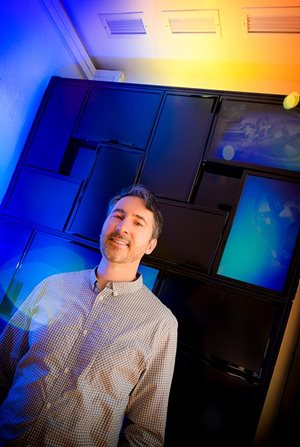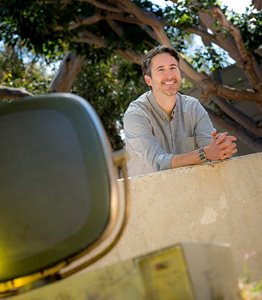By Henry DeVries
In his book "Innovation Nation," author and former Harvard Business school professor John Kao argues that the United States, once the world’s leading innovator, should step up the pace to regain its innovative edge. Elected officials from President Barack Obama to San Diego Mayor Kevin Faulconer are singing the praises of the innovation economy as the path to prosperity.
 “But there is a dark side to innovation,” says UC San Diego Professor of Sociology John Skrentny. “While it is better for consumers and the economy to have innovation, workers may feel they are on a treadmill and need to continually update skills just to keep pace.”
“But there is a dark side to innovation,” says UC San Diego Professor of Sociology John Skrentny. “While it is better for consumers and the economy to have innovation, workers may feel they are on a treadmill and need to continually update skills just to keep pace.”
After spending many years studying law and policy related to equal opportunity, Skrentny’s research and writing interests expanded to include what some call the science of science and innovation policy—especially as these relate to the workforce of scientists and engineers, the immigration of scientists and engineers, as well as regional economic growth.
“My interest began when I discovered how many tech employers were having a hard time finding workers with the right science and engineering skills,” says Skrentny, who is also the co-director of the Center for Comparative Immigration Studies at UC San Diego. “There is a global battle for brains, a worldwide war for talent.”
Skrentny received his B.A. in sociology and philosophy from Indiana University and his Ph.D. in sociology from Harvard University. His primary areas of research and teaching interest are law, politics, and public policy, especially as they relate to equal opportunities, immigration, the science and engineering workforce, and job creation.
“Though trained in sociology, I believe we can best understand our world when we integrate insights from a variety of disciplines,” he says.
Skrentny is currently collaborating on a grant-funded research study with UC San Diego Dean of Extension and Professor of Sociology Mary Walshok, an industrial sociologist who has studied workplace issues for more than three decades. Together they are studying the role played by university continuing education and extension schools in addressing the talent needs of regional innovation economies.
“My interest in extension schools is how workers can stave off obsolescence. University extension programs are what Professor Walshok calls ‘America’s shadow training system,’ but no one collects data on the programs, studies the models, or understands the best practices,” says Skrentny. “Together Professor Walshok and I are examining the role extension schools play in providing the necessary skills for tech regions.”
The study of extension programs is part of a larger effort to understand the dynamics of demand for skilled workers in the United States and abroad.
According to Walshok, many formerly prosperous cities across the United States are struggling to keep up with an increasingly global economy and the continued decline of post-war industries like manufacturing, and now face the issue of how to adapt to today’s knowledge economy. In her most recent book from Stanford University Press, "Invention and Reinvention: The Evolution of San Diego’s Innovation Economy," Walshok and coauthor Abraham Shragge chronicle San Diego’s transformation from a small West Coast settlement to a booming military metropolis and then to a successful innovation hub.
Both Walshok and Skrentny agree that innovation comes with a cost.
“Tech employers are under a great deal of pressure to produce amazing products at low costs, so they must constantly search for the skills they want,” says Skrentny. “Often it takes too long to train current or new employees, and migrants often have what employers are looking for right now. In fields like software, where employees work together as teams, one weak link can make an entire project fail. Employers really need top skilled people, and they are fighting to get them.”
Walshok agrees noting that the nimbleness and speed with which extension schools can provide the practical skills required, even of college grads, has resulted in an annual enrollment of nearly 70,000 at UC San Diego Extension, as well as equivalent numbers at institutions such as UC Berkeley and the University of Washington.
 Skrentny’s books include "The Ironies of Affirmative Action: Politics, Culture, and Justice in America," "The Minority Rights Revolution," and his latest book from the Princeton University Press, "After Civil Rights: Racial Realism in the New American Workplace." This book explores the ways that economic, demographic, and political changes have helped create a new strategy for managing race in the workplace.
Skrentny’s books include "The Ironies of Affirmative Action: Politics, Culture, and Justice in America," "The Minority Rights Revolution," and his latest book from the Princeton University Press, "After Civil Rights: Racial Realism in the New American Workplace." This book explores the ways that economic, demographic, and political changes have helped create a new strategy for managing race in the workplace.
“My interest has always been in justice and a fair shake for everyone,” says Skrentny. “This new work is really about how to create more jobs for everyone. Jobs are a dependent variable of success, and having a large population of skilled workers allows companies to grow and create more jobs for everyone. If firms can’t find the right workers, they won’t stay in San Diego and develop new product lines.”